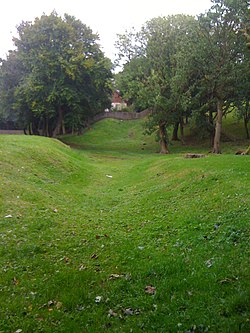Watling Lodge (original) (raw)
From Wikipedia, the free encyclopedia
| Watling Lodge | |
|---|---|
 |
|
  Location within Scotland Central Belt Location within Scotland Central Belt |
|
| Founded during the reign of | Antoninus Pius |
| Founded | 142 AD |
| Place in the Roman world | |
| Province | Britannia |
| Structure | |
| — Turf structure — | |
| Location | |
| Coordinates | 55°59′51″N 3°49′31″W / 55.9976°N 3.8253°W / 55.9976; -3.8253 |
| Town | Near Tamfourhill |
| County | Falkirk |
| Country | Scotland |
| Site notes | |
| Condition | Ruined |
Watling Lodge was a Roman fortlet on the Antonine Wall in Scotland.[1] It was located near what is now Lock Sixteen on the Forth and Clyde Canal in Falkirk with neighbouring forts at Rough Castle to the west and Falkirk to the east.[2] There was also a fort at Camelon to the north. There was also a Roman temporary camp found a short distance south of the site.[3]
Watling Lodge has been described as the best preserved stretch of ditch from the Antonine Wall still in existence today.[4] It is situated along Tamfourhill Road, south-west of Falkirk.[5] This stretch is excellently preserved.[6] One of the best overviews of the site is the video of the Bridgeness Slab by Falkirk Council,[7] presented by Geoff Bailey, Keeper of Archeology and Local History at Falkirk Museum, from about 4 minutes 30s.
In Falkirk, the site is signposted from the A9 and is accessed from the B816, Tamfourhill Road.[8] There is an information panel fairly close to the top of the wall.[9] The panel shows how the Wall may have looked, and suggests Watling Lodge's place in the grand design of the construction.[10]
Excavation and finds
[edit]
Sir George Macdonald wrote about the site.[11] A digital reconstruction of the fortlet has been created.[12] A Minecraft model of the site has also been constructed.[13]
Many Roman forts along the wall held garrisons of around 500 men.[14] Larger forts like Castlecary and Birrens had a nominal cohort of 1000 men[15] but probably sheltered women and children[16] as well, although the troops were not allowed to marry.[17] It is likely that large communities of civilians were located around the site.[18]
Antonine's Wall at Watling Lodge near Falkirk
Ditch of the Antonine Wall at Watling Lodge
Forts and Fortlets associated with the Antonine Wall from west to east: Bishopton, Old Kilpatrick, Duntocher, Cleddans, Castlehill, Bearsden, Summerston, Balmuildy, Wilderness Plantation, Cadder, Glasgow Bridge, Kirkintilloch, Auchendavy, Bar Hill, Croy Hill, Westerwood, Castlecary, Seabegs, Rough Castle, Camelon, Watling Lodge, Falkirk, Mumrills, Inveravon, Kinneil, Carriden
- ^ "Watling Lodge". CANMORE. Royal Commission on the Ancient and Historical Monuments of Scotland. Retrieved 14 November 2017.
- ^ "OS 25 inch map 1892-1949, with Bing opacity slider". National Library of Scotland. Ordnance Survey. Retrieved 12 October 2017.
- ^ "TAMFOURHILL AND WATLING LODGE: SECTION OF DITCH AND FORTLET" (PDF). Frontiers of the Roman Empire. Retrieved 19 May 2018.
- ^ "Antonine Wall World Heritage Site". visitscotland. Retrieved 17 November 2017.
- ^ "Barnardo's". The Falkirk Herald. Retrieved 17 November 2017.
- ^ "Watling Lodge Antonine Wall Fortlet & Camp". Roman Britain. Retrieved 17 November 2017.
- ^ "Roman film now online". Kinneil Estate, Bo'ness. Retrieved 22 October 2017.
- ^ "Watling Lodge". Frontiers of the Roman Empire. Retrieved 17 November 2017.
- ^ ""Antonine Roman Wall (Watling Lodge section)"". TripAdvisor. Retrieved 17 November 2017.
- ^ Ross, David. "Watling Lodge (Antonine Wall)". Britain Express. Retrieved 17 November 2017.
- ^ Macdonald, Sir George (1934). The Roman wall in Scotland, by Sir George Macdonald (2d ed., rev., enl., and in great part rewritten ed.). Oxford: The Clarendon press. pp. 127–128. Retrieved 11 October 2017.
- ^ "Reconstruction of fortlet, Watling Lodge". Retrieved 19 May 2018.
- ^ "Watling Lodge". Dig It! 2017. Retrieved 17 November 2017.
- ^ "Soldier". Frontiers of the Roman Empire. Retrieved 21 October 2017.
- ^ Miller, S. N. (1952). The Roman Occupation Of South Western Scotland Being Reports Of Excavations And Surveys Carried Out Under The Auspices Of The Glasgow Archaeological Society By John Clarke, J. M. Davidson, Anne S. Robertson, J. K. St. Joseph, Edited For The Society With An Historical Survey By S. N. Miller. Glasgow: Robert Maclehose & Company Limited. Retrieved 11 October 2017.
- ^ "Children". Frontiers of the Roman Empire. Retrieved 21 October 2017.
- ^ "Roman child's leather shoe". A History of the World. BBC. Retrieved 17 October 2017.
- ^ Rohl, Darrell, Jesse. "More than a Roman Monument: A Place-centred Approach to the Long-term History and Archaeology of the Antonine Wall" (PDF). Durham Theses. Durham University. Available at Durham E-Theses Online ref: 9458. Retrieved 14 October 2017.
{{[cite web](/wiki/Template:Cite%5Fweb "Template:Cite web")}}: CS1 maint: multiple names: authors list (link)


